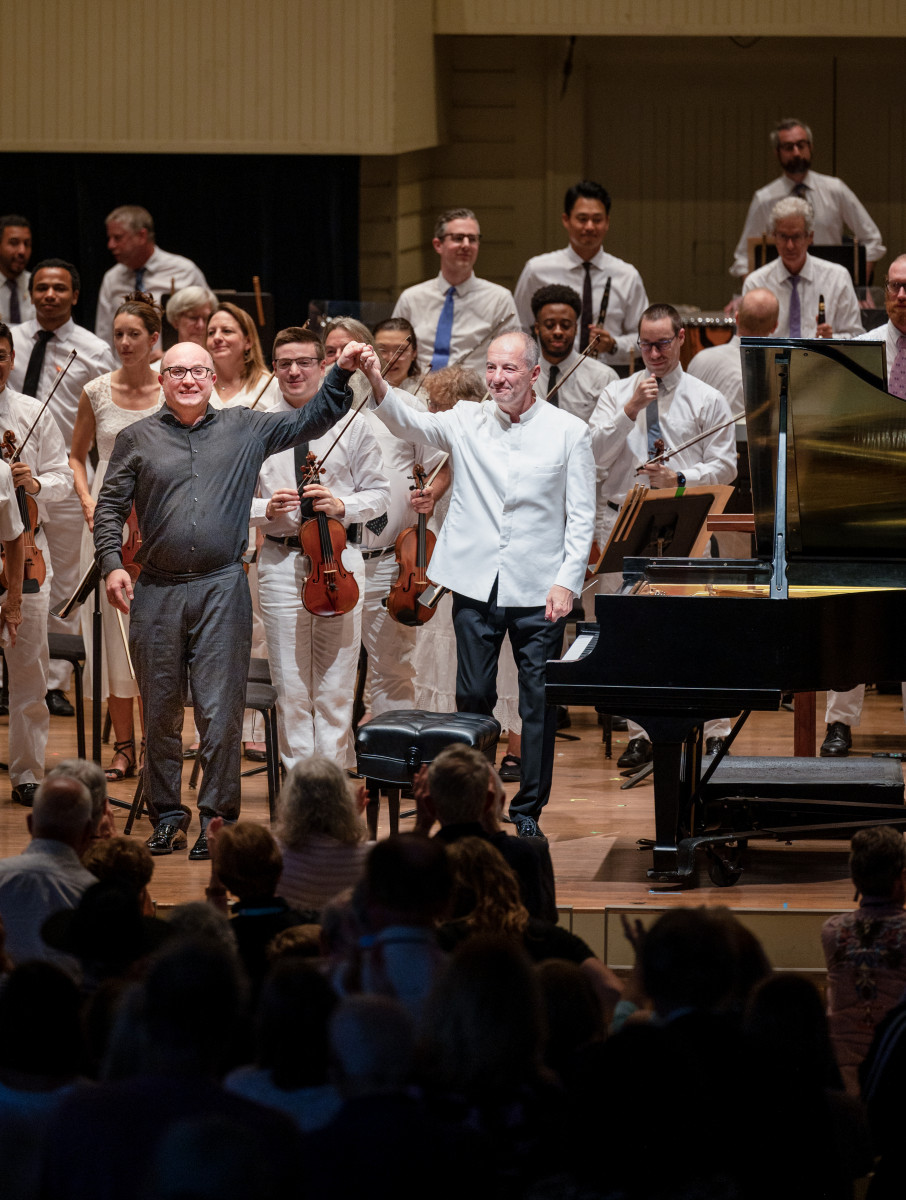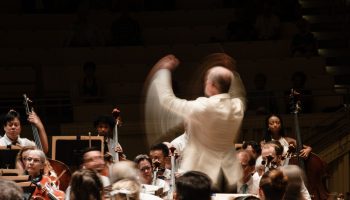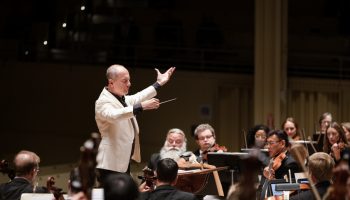
Pianist Alexander Gavrylyuk and the Chautauqua Symphony Orchestra, conducted by Music Director and Principal Symphonic Conductor Rossen Milanov, take a bow after their performance of Rachmaninoff’s “Rhapsody on a Theme of Paganini” July 27, 2023, in the Amphitheater.
Composers like Edvard Grieg and Modest Mussorgsky lived, worked and died more than 100 years ago, but the pieces they created are still filled with vibrancy and heart.
Breathing even more life into Grieg’s Piano Concerto is Alexander Gavrylyuk, who joins the Chautauqua Symphony Orchestra and Maestro Rossen Milanov at 8:15 p.m. tonight in the Amphitheater for the first half of a program that closes with Mussorgsky’s “Pictures at an Exhibition.”
Grieg’s Piano Concerto in A minor was composed in 1868, a year after he and his wife Nina married and around the time their daughter Alexandra was born; this was a relatively happy period in his life and the piece was written on a family vacation near Copenhagen. The premiere was well received; however, Grieg was never fully satisfied with the concerto, and continued to pen revisions up until he died.
Mussorgsky was an almost entirely self-invented composer; CSO First Violinist Olga Kaler believes him to be “a genius of the highest order, because so much of his music is completely self-invented.”
“Pictures at an Exhibition” was Mussorgsky’s attempt to bestow immortality on Viktor Hartmann — an artist and close friend who died of an aneurysm — by modeling the melody after individual works in Hartmann’s exhibition.
Kaler is a fifth-generation musician — her father was a celebrated Moldavian composer — and began playing violin at 3 years old. When she realized the “connection between performer and the audience” when playing live, she fell in love. Everything in her life has been centered around music, she said, though it can be a jealous mistress.
“You have to practice, especially with the string instrument or piano, countless hours a day,” Kaler said. “When you’re not practicing, you’re thinking about music, you’re listening to music or reading about music.”
Both Kaler’s husband Ilya and son Daniel are musicians, as well. She and Daniel (a cellist and one of the newest CSO members, as well as the youngest) are the very first parent-child duo to play in the CSO at the same time. In addition to her summers as the CSO’s first violin, Kaler is also a professor at the Cleveland Institute of Music; over the years, she’s noticed that her teaching influences her playing, and vice versa.
“When I practice, I think, if I were my own student, would I still be happy with what I just did? And if not, how do I improve this? The great thing about being a teacher is that it organizes your thoughts,” she said. “It teaches you to find the reasons why things may not work exactly as you envisioned and find the solutions much quicker than someone who has never had to teach. … Teaching helps you to understand the instrument, and its workings so thoroughly that — if you’re honest with yourself and others — it helps keep yourself in shape, as well as help others to learn.”
As artist-in-residence at Chautauqua Institution, Gavrylyuk, too, has his own experiences teaching. The internationally recognized pianist first visited Chautauqua at 22, after he had just won the Gold Medal at the Arthur Rubinstein International Piano Masters Competition.
Upon his very first visit, Gavrylyuk developed a friendship with the Kalers; according to Kaler, he practices nothing short of eight to 10 hours a day.
“In addition to being a flawless pianist with effortless technique and really quite an extraordinary, expressive range, what I really love about his music-making is you feel like he plays chamber music with every single one of us,” she said. “He really listens to the orchestra. He reacts to what he hears, and the music is very much alive — it’s nothing short of extraordinary.”




